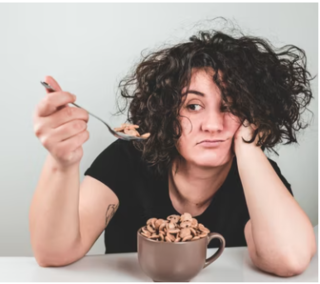Addiction
When You Use Food to Check Out on Feelings
Recovery from food addiction requires more than just cutting out calories.
Posted May 2, 2022 Reviewed by Davia Sills
Key points
- It's natural to overeat during stressful times.
- People tend to turn to food for comfort and distraction when they don't know how to cope with difficult feelings.
- Having self-compassion and becoming aware of their true emotions can help people address the root cause of their overeating.
Most of us have heard the term “freshman 15,” referring to the 15 pounds many college students put on in their first year away from home. But a similar phenomenon occurs for many adults over the wintertime. When we have to stay inside, we humans go through our own hibernation process, which often results in overeating and an uptick in clothing size or full-on surrender to sweatpants.

But it’s not just the winter months; COVID, too, led us to food as a way to manage the fear, anxiety, and uncertainty of the last couple of years. Food served as comfort, pleasure, distraction, as well as a solution to boredom. As a result, many people ended up with a lot of extra weight, which now has its own name: “the COVID 15.”
So, as spring blooms, you may find yourself wanting to bloom into a new body, one that can fit back into your old clothes or into new clothes without an elastic waistband. Now that normal life is opening up, you may want to feel lighter and healthier, your best self, able to get out there and enjoy all that’s possible again.
But this piece is not about eating less or differently or exercising more or smarter; it’s not about the practical elements involved in shedding your winter or pandemic pounds. You can find diet and exercise information in countless other places—far better information than I can offer. And, in fact, you probably know all that information already—what you should be eating, how and how much you should be moving. I’m not here to address diet and exercise strategies because, ultimately, such strategies don’t usually work, at least not in any lasting way. They fail because they address only the symptom of the problem, the excess weight itself, but not the underlying cause of it.
You probably frame your overeating as a form of indulgence and desire run rampant, as we’ve been conditioned to view it. You imagine that you overeat because you want the food; you don’t want to stop; it tastes so good. And while that may be true, in fact, we overeat not because we want so much of the food… let’s be honest, the fourth bowl of ice cream doesn’t taste that good. We compulsively use food because we don’t want to feel what we’re feeling in that moment. As with any addiction, we use the substance (in this case, food) to anesthetize ourselves from the feelings we don’t want or know how to feel.
If you’re an overeater, your brain (through no fault of your own) has built a link between food and relief, between food and comfort. When difficult emotions arise, therefore, your brain reacts by telling you that food is the solution; food will make your uncomfortable feelings go away; food is a relief. It tells you this silently, without you even realizing it’s telling you. The impulse to reach for food when difficult feelings arise or even threaten to arise is unconscious and habitual. Your brain has now incorporated this link, this belief that food is relief from suffering, into its intricate network of truths.
In order to break your addiction to food, ironically, you need to be willing to turn your focus away from food and the management of it and toward the feelings that precede and trigger the eating—the internal experience that sets off the external response of opening the fridge. In order to do this, you have to slow down the process that starts with unwanted feelings and ends with food or really ends with negative feelings about your body and yourself.
When you feel the urge to overeat, you must choose to do something different.
Namely, to stay awake and conscious—to stay with yourself in your present reality. You do this by getting curious about exactly what’s happening inside you—before heading to the snack drawer. Right there, in the eye of the storm, with the urge to check out and the uncomfortable feelings all raging, you must be willing to just stay. The fiercest and most courageous thing you can do at that moment is to ask yourself, "What am I experiencing right now that I want to get away from? What feelings are here that I don’t want to feel?" While chocolate may feel like the kindest and most compassionate thing you can do for yourself at that moment, it isn’t. Listening to and caring about what you’re experiencing, turning toward your heart… this is true self-compassion.
What breaks the habit of overeating is lighting it up with awareness, thereby interrupting the link between the trigger and your habitual response. While it’s counterintuitive to move toward what’s uncomfortable, what we want to run from, in fact, it’s precisely in getting to know your own experience that you feel better—even when the feelings you discover don’t feel good. Your willingness to bring your kind and non-judgmental curiosity to what’s happening inside your heart, head, and body is the kryptonite to overeating or any other habitual behavior.
An exercise in compassion:
When you think about it, giving yourself cookies when what you really need is comfort is a bit like trying to use a banana to open a door lock. It’s simply the wrong tool for the task at hand. And yet, this is what we do over and over again; we feed our mouth when it’s our heart that needs our care.
Over time, this misaligned response to our own discomfort starts to feel normal; we mistake numbing our discomfort for true relief and start to believe that food is actually what makes us feel better. But the feelings we numb with food don’t go anywhere other than to sleep, temporarily. Food allows us to distract ourselves from our experience, which then creates a new experience that’s all about our weight and what’s wrong with us that we can’t stop overeating. But whatever experience was there before we sedated and re-routed it is still there; we haven’t actually taken care of it.
If you’re an overeater, you have learned to sedate your feelings with food when what they really want is your attention and compassion. And the sad thing is that your feelings have gotten accustomed to this treatment, accustomed to being abandoned.
Chances are, there was a time when you tried to get real comfort for what you were feeling. You probably went to your caretakers for an emotional hug, an attuned response that would make your uncomfortable feelings feel better; you went looking for a key rather than a banana. But perhaps your caretakers were unavailable, uninterested, or unable to sit with you and your feelings and thus unable to make you feel better. Your caretakers turned away from your feelings and maybe even sent you away with cookies as a bizarre and unrelated replacement for the real comfort that you needed. They left you alone with your unprocessed and uncomfortable experience, without any tools to take care of or comfort yourself. And so you turned to food, which makes sense in a primitive brain. It’s adaptive in that it makes the feelings go away, which is the goal.
But it’s also a heartbreaking process; it sends the message to your heart that it’s not going to get what it really needs, not going to be attended to with real attention and care—that the best it can hope for is the dullness of a food coma. Imagine yourself at an age when you still believed you could get what you really needed from your caretakers. Imagine the process of your heart slowly scarring over and giving up on real comfort, surrendering to food as its most reliable alternative.
As the earth opens and blooms, there’s an opportunity to not just hang up the sweatpants but to encourage your own heart to bloom. You can make this a time to give yourself real comfort and real care. You can correct that early experience when you learned that the best hope for feeling better was anesthesia.
When you feel the urge to eat addictively…
1. Stop, take a deep breath, and place your hand on your heart or belly. Ask yourself, "What’s here that I don’t want to feel?"
2. Ask yourself (lovingly) what’s happening inside you at that moment. Refrain from judging, shaming, solving, or interpreting the feelings that come. Just listen and allow their presence.
3. Remind yourself that your experience matters—that you matter.
4. Stay present with yourself for a minimum of three minutes before doing anything else.
If after this exercise, you still want to eat, that’s OK. But agree to take these few steps before putting anything in your mouth. Commit to staying, not abandoning yourself, and learning to offer yourself what you really need and what maybe you always needed.




